

“WE









IHF President
MICHAEL MAGNER on recruitment and the cost of doing business



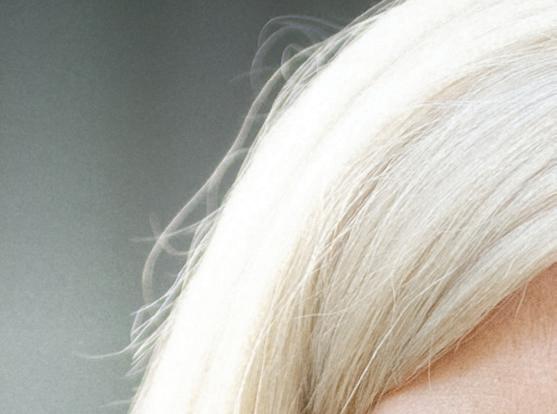





NEED A FIT FOR PURPOSE INDUSTRY”
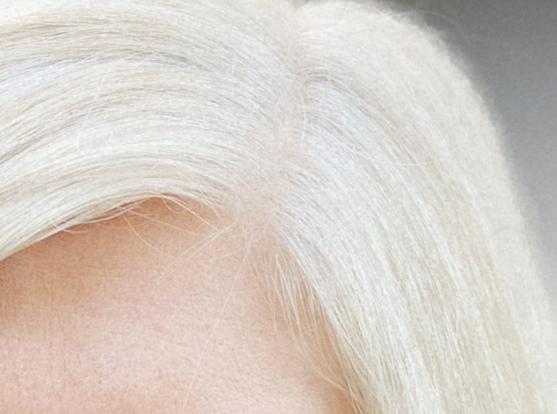
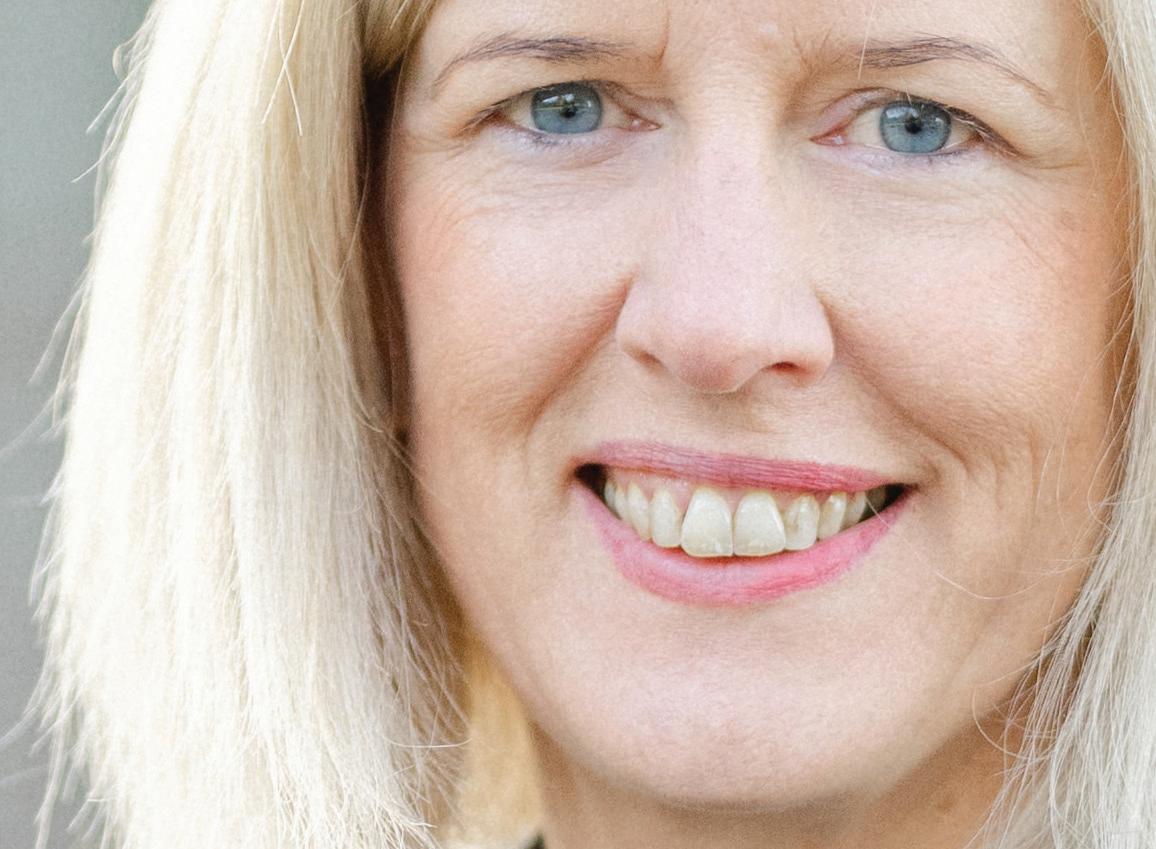













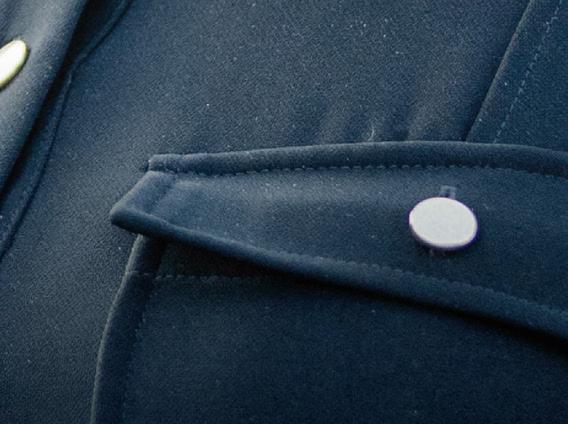






“WE









IHF President
MICHAEL MAGNER on recruitment and the cost of doing business









NEED A FIT FOR PURPOSE INDUSTRY”





















EMER CORRIDAN is taking Cahernane House to the next level


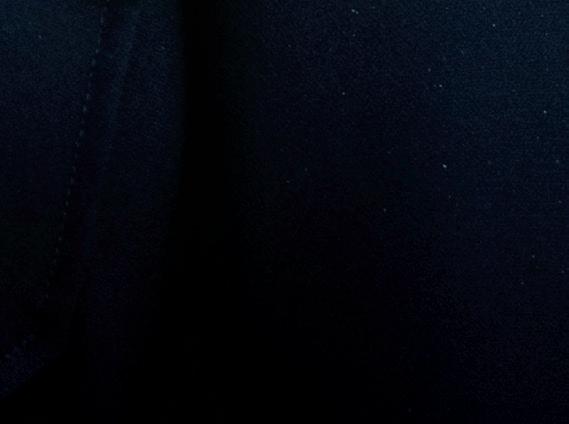




In CONVERSATION with... PATRICIA ROBERTS at No 1 Pery Square
























“I think young people probably don’t realise the variety of roles that are available to them with a degree in hotel management. Traditionally, it was seen as a job with long unsociable hours but for many roles in the industry, that’s not the case anymore. The possibilities are endless.”
Emer Corridan, General Manager, Cahernane House




Twelve Nordic-style cabins have opened at Ballygarry Estate Hotel and Spa
IHF President Michael Magner is calling for a framework that ensures the industry is fit for purpose
No 1 Pery Square’s Patricia Roberts on Limerick’s thriving tourism market and delivering on the customer experience
Paul Hickey at Fitzpatrick Castle Hotel on why he loves the “organised chaos” of the industry
If they’re to attract the Gen Z generation hoteliers must recognise their traits and needs, writes Donagh Davern
For Tim Daly, a meal at Noma was a lesson in creativity, discipline and purpose


Editor: Denise Maguire
Creative Director: Jane Matthews
Art Director: Lenny Rooney
Stock Photography: iStock
Infographics: www.flaticon.com
Production: Claire Kiernan
Sales Director: Trish Murphy
Managing Director: Gerry Tynan
Chairman: Diarmaid Lennon
Published by:
Ashville Media,
Unit 55 Park West Road, Park West Industrial Estate, Dublin 12, D12 X9F9. Tel: (01) 432 2200
ISSN: 0332-4400
All rights reserved. Every care has been taken to ensure that the information contained in this magazine is accurate. The publishers cannot, however, accept responsibility for errors or omissions. Reproduction by any means in whole or in part without the permission of the publisher is prohibited. © Ashville Media Group 2025. All discounts, promotions and competitions contained in this magazine are run independently of Hotel & Catering Review. The promoter/ advertiser is responsible for honouring the prize.

Editor: Denise Maguire
Email: denise.maguire@ashvillemediagroup.com
Welcome to issue 5 of Hotel & Catering Review 2023
Bookings for the summer season at Cahernane House are looking good, says GM Emer Corridan. The US market is particularly buoyant, although she notes a drop in numbers from Germany and France. The reason for that decline isn’t clear; it could be down to price or perhaps European tourists are foregoing Ireland for other regions. Since being purchased by PREM Group in 2016, the Killarney hotel has undergone a major revamp with a €10 million investment restoring the original Manor House to its former glory. Additional bedrooms are in the mix in the next year or two, along with a new kitchen. For more on Cahernane House, go to page 22. Elsewhere in this issue, IHF President Michael Magner chats about the recent CSO figures which showed inbound tourism was down 4% year-on-year. The figures contrast greatly with industry data on the ground, he says, which reflects a much more optimistic view of the industry. Michael also talks about the need for a robust business environment that suits the needs of hotels of all sizes and why The National Training Fund should be used to help address skills deficiencies in the industry. On page 17, Patricia Roberts at No 1 Pery Square talks about the sustainable revolution that’s happening across Limerick city and county. Tourists are visiting the area for its abundance of outdoor activities and they’re opting to book longer stays. Bookings are strong at the 21-bedroom Georgian townhouse which, says Patricia, offers proper Irish food and Irish experiences, “in a property that had a sense of place and history.” Finally, on page 10 we chat to Ballygarry Estate owner Padraig McGillicuddy about The Estate Cabins, a new off-grid tourism concept that’s making waves in the South West of Ireland.
As always, there’s plenty to enjoy in this issue. If you have any thoughts or opinions on this month’s content, please do drop us a line.

























WINNERS
WATER: Dingle Sea Salt
For producing Ireland’s first solarevaporated sea salt using a fully off-grid, low-carbon process.
LAND: Coole Farm
For cultivating vibrant, organic salad leaves with care and intention.
FARM: Moy Hill Farm
For their ethical, regenerative egg production and their holistic approach to farming that nourishes both land and people.
DAIRY (Cultured Butter): Salt Rock Dairy
For handcrafting cultured butter using milk from their own herd and Wexford sea salt.

DAIRY (Soft Cheese): Ballylisk – The Triple Rose
For their rich, triple cream cheese made from a single pedigree herd in Armagh.
ARTISAN PRODUCE: Wild Irish Foragers
For preserving Ireland’s edible wild heritage through handcrafted syrups, shrubs and jellies made from foraged botanicals.
TRADITIONAL CRAFT/SKILL: Seagull Bakery
For championing real bread made from Irish-grown grains and bold fermentation.


“The Irish kitchen table is a symbol of trust, care and resilience,” said Aishling Moore of Goldie in Cork, Head of the EuroToques Food Council. “It is where we learn the fundamentals of food – not just how to cook, but how to value what we eat and who we share it with.” Conor Halpenny of Square Dundalk, Chair of Euro-Toques Ireland, added: “We are honouring those who have kept Irish food grounded – producers and craftspeople who quietly shape our national identity through their work every single day.”

































Powerscourt Hotel Resort & Spa has announced the launch of Taste the Season – a seven-course tasting menu at SIKA Restaurant. Curated by Executive Chef Cormac McCreary and his culinary team, each dish tells a story of local provenance and creativity. Menu highlights include seared scallops with yuzu and miso, Wicklow lamb paired with wild garlic and fèves and halibut with spring cabbage, apple and vanilla. “At this time of year, nature offers us such fresh, elegant ingredients – it is a joy to work with. We are guided by what is at its peak and we let that lead the way, creating exciting dishes rooted in the season's beauty.”



Until the end of June, over 350 pieces of artwork will be on display at Castlemartyr Resort. At Art + Soul, guests can take a stroll past a Salvador Dalí sculpture on the lawn, encounter Andy Warhol’s pop-art en route to dinner, or glimpse a Damien Hirst masterpiece on the way to their suite for the night. The centrepiece of the exhibition is an outdoor collection of more than 100 sculptures featuring artists like Patrick O’Reilly, Giacinto Bosco and Nic Fiddian-Green. Inside the hotel, over 200 artworks are on display including works by Gordon Harris, Peter Monaghan and Martin Mooney.
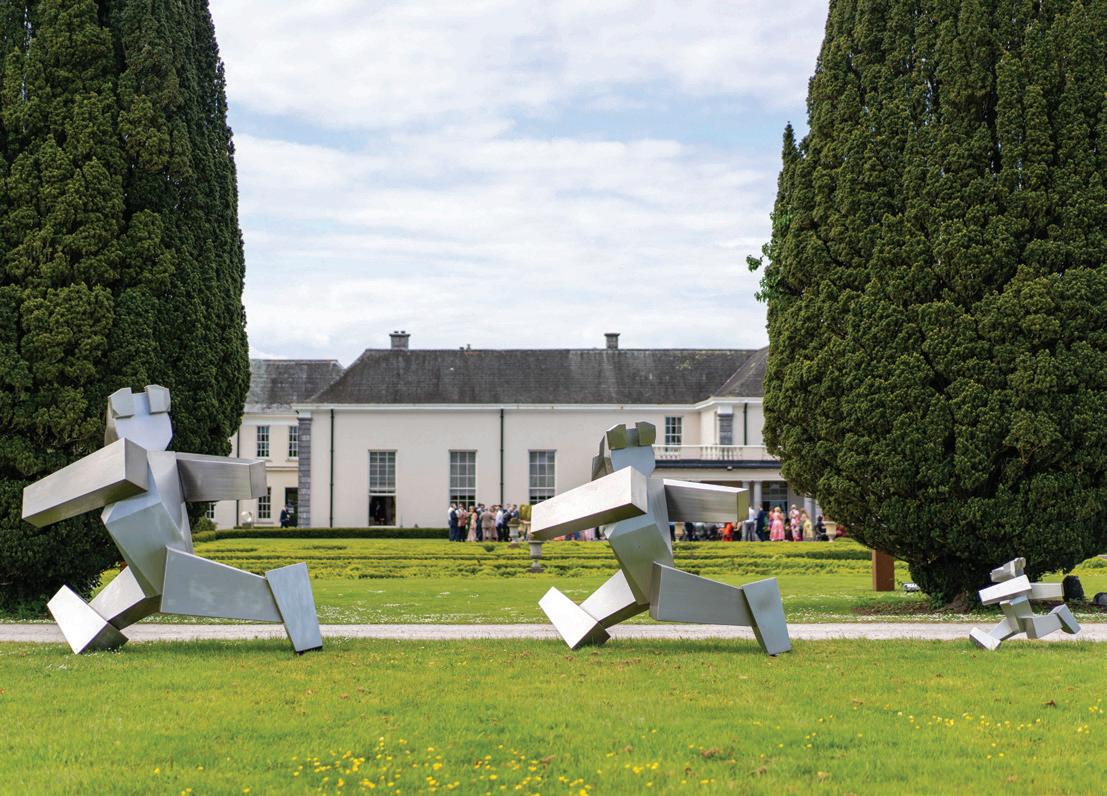
The Red Carnation Hotel Collection has announced two new appointments at Ashford Castle. Gregory Brossard is joining the team as Hotel Manager, while Lisa Toomey will take up the Director of Quality role. French native Gregory joins the Ashford Castle team after almost two years working at the Conrad Hotel in Dublin as Director of Operations. Lisa, who precedes Gregory as Hotel Manager, will assume a brand-new senior role as Director of Quality for the wider Ashford Castle Estate. Lisa started her career at Ashford Castle in 2017. Her new responsibilities will see her ensure all aspects of operations at Ashford Castle and The Lodge at Ashford Castle meet and exceed guest expectations.

















Louise McNamara has taken up the role of General Manager at The Metropole Hotel in Cork. Previously, Louise held roles at Mount Juliet Hotel, Fota Island Resort, Windward Management and Capella Hotels and Resorts. She was also the Deputy General Manager at The Montenotte Hotel. “It is an honour for me to join the team at the Metropole Hotel, which is currently undergoing an exciting renovation of its ground floor area. I look forward to working with the team to bring a unique experience for all our customers, both locals and visitors alike.”









JP McMahon is set to open a new ramen and bao bar on Druid’s Lane in Galway this summer. The chef describes Kombu – named after the Japanese seaweed – as a “love letter to Japan” with dishes featuring bowls of ramen, teriyaki, tempura, rice dishes and a selection of bao buns, including a chocolate ganache bao bun topped with wasabi sea salt. “Kombu is a realisation of my love of Japanese food, which I’ve long admired. I’ve taught Japanese cooking classes at Aniar for years, our Ramen and Bao Bar pop-ups have been a big hit at Aniar as part of Blas na Gaillimhe Festival of Food and of course, I’m passionate about cooking with seaweed, utilising it broadly in Aniar – so this felt like a natural evolution.”
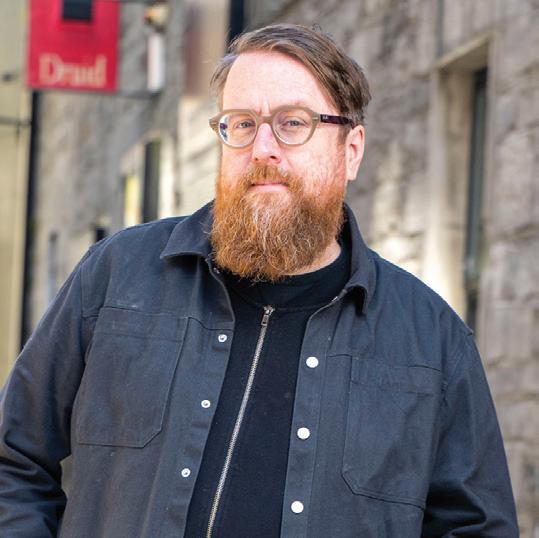
Hotel Killarney has officially been awarded four-star status by Fáilte Ireland. The accreditation follows a significant refurbishment programme that was completed last year which included updated bedrooms and public spaces and upgraded leisure facilities. Family facilities have also been enhanced, with the addition of updated play zones, an expanded kids club, the introduction of Cubbie sensory hubs and improved family room options. “This recognition means the world to our team. Many of them have been with us for years and I know they are all so proud of this achievement. We’ve always aimed to offer a warm welcome and genuine, heartfelt hospitality to our guests, and now that’s perfectly matched by four-star comfort, service and style. We love welcoming our guests into a space that reflects the best of Killarney. Warm, inviting and now with four stars – we’re delighted,” said General Manager, Misja Herfurt.

















The Oriel House Hotel in Ballincollig has officially rebranded as Talbot Hotel Cork. Over €500,000 was invested into the hotel in 2024, part of a broader €1.15 million refurbishment initiative in recent years. The rebrand aligns with the Talbot Collection’s strategic vision to provide outstanding service and modern facilities across all its properties. General Manager at the Talbot Hotel Cork, Janice McConnell, said: “This exciting rebrand is a testament to the strength and growth of the Talbot Collection. By aligning our Cork property under the Talbot name, we are reinforcing our dedication to delivering exceptional food and service by our committed team and creating unforgettable experiences and lifelong memories. Our talented team will continue to be at the heart of these efforts, ensuring every guest enjoys the very best of what we have to offer.”
Dublin chef Jake Gamboa, recently crowned Aramark Ireland Chef of the Year 2025, represented Ireland at the Aramark International Chefs Cup. The Filipino-Irish chef brings a fusion of cultural influences to his cooking. Inspired by childhood memories of his family’s Filipino home cooking and his experience working in some of Dublin’s top kitchens, including Chapter One, his cooking reflects both his heritage and his Dublin roots. “It was truly an honour to represent Aramark Ireland and showcase Irish produce through the lens of Filipino cuisine,” says Gamboa. “I never imagined myself competing in a culinary competition and I’m incredibly grateful to my mentor, David Joyce, for encouraging me to take this leap.”




Alan Andrews on bringing together the best in specialty coffee, culture and community at the Birdhill Coffee Festival
For the second year running, The Birdhill Coffee Festival will take place from 27-29 June at The Old Barracks Coffee Roastery in Birdhill, Co Tipperary. The adult-only event will feature exhibitors, interactive workshops, live barista competitions, guest speakers, educational masterclasses, brewing demos and exclusive tastings, along with a BBQ on the Friday to celebrate 10 years of speciality coffee at The Old Barracks.
“We held the festival for the first time last year to give more people the opportunity to taste a variety of coffees that they mightn’t normally go for. We run four different coffee shops; at our Birdhill shop, our coffees range from €5 up to €20, depending on what country you want to taste. As part of the festival, attendees can use their token to try one of the more expensive coffees that they mightn’t normally opt for,” says Alan Andrews, Festival founder and owner of The Old Barracks Coffee Roastery.


At the event, experts from Sage Espresso will be on hand to showcase the latest equipment for your home and demonstrate how to get the best from your coffee machine. There’ll be demonstrations on how to make the best Irish coffees and Espresso Martinis and there’ll be a wellness area, with organic Kombucha, coldpressed juices and wellness shots from SISU.
Business is good across the four shops, says Alan. “In Q1 this year we were up 26% on Q1 2024. Last year’s festival definitely boosted profits – some people discovered Birdhill for the first time and just kept coming back. We were also selling coffee machines for several weeks after the event. We've worked hard at positioning ourselves in the market and delivering great service and consistency in quality. When you do that, price isn’t an issue.

Obviously not everybody's buying €15 or €20 coffees, but there's a lot of people that come to Birdhill to buy €7, €8 and €9 coffees.”
To book your ticket for the Birdhill Coffee Festival, go to www.theoldbarracks.ie





























Some 300 delegates gathered at the Midlands Park Hotel at the end of May for the fourth annual Irish Hotels Federation (IHF) People Day Conference. Focusing on career development, people-empowerment, staff retention, inclusivity and more, the conference is part of the IHF’s ‘Shaping Brighter Futures’ programme. Speaking at the event, IHF President Michael Magner said: “At the heart of every great hotel and guesthouse is our people – the many thousands of individuals who choose a career in our sector. And what an amazing profession we have with so many interesting people-centred career opportunities. We are right at the heart of our communities, employing over 69,000 people directly and supporting over 270,000 livelihoods within our wider tourism industry.”


Ian Brennan and Joanna Hannick have completed phase one of a project to restore The Club House Hotel Kilkenny. The hotel was established in 1797 as the local Foxhunting Club House. In 1817, it became one of the first properties in Ireland to be given the title ‘hotel’, providing a rest stop as the new Cork Road opened. Phase one of the €2.5 million refurbishment included renovation of the 25 bedrooms and suites and a newly decorated lobby and reception. An early 1800s iron porch, which held Kilkenny’s first electric streetlight, was also restored in a collaboration between conservation specialists Canice Architects, metal restoration company Maiwald & Mosse and the Heritage Council. “Looking ahead, we have plans to continue the restoration of the family hotel. Since dad, Jim, retired, it’s our responsibility to carry on that legacy and make sure The Club House continues to be a place where memories are made and tradition lives on,” said owner and Managing Director Ian Brennan.


Registration is now open for Open Kitchen Week, an initiative from Chef Network, taking place countrywide from 10-16 November. Now in its third year, the programme presents an opportunity for aspiring chefs of all ages and backgrounds to gain hands-on experience working behind the scenes in a selection of Ireland’s professional kitchens. Chef Network also hopes to welcome parents, teachers, career guidance counsellors and journalists who can influence career choices. For host kitchens, it provides a valuable chance to showcase the industry in a positive light, draw in new talent and contribute to building a sustainable future for the culinary sector. Chef Network hopes to encourage a diverse range of kitchens to take part, showcasing the wide variety of kitchens within the industry. Host kitchens are asked to offer up to three kitchen guest slots; these can be anything from a couple of hours up to a maximum of eight hours long. Kitchens can sign up now on the Open Kitchen Week website and Chef Network will be in touch to guide them through the participation process. www.openkitchen.ie








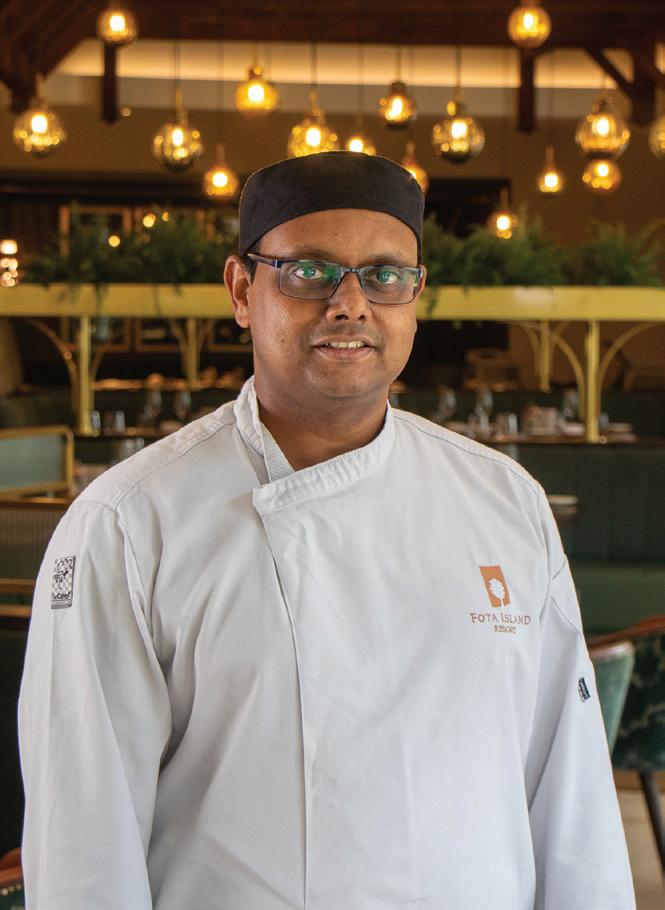




Ingredients







Duck has always been my go-to protein. It’s richer, more flavourful and brings something a bit special to the table. When I was working in Malaysia and Singapore, I really saw how central duck is to Cantonese cooking. I had never come across so many different ways of preparing it. Over there, it’s something to celebrate. This dish brings together classic methods like pithivier, confit and rendered fat, while also playing with bolder flavours like smoked apple and lime jelly. It’s a mix of tradition and new ideas that keeps things interesting. You don’t often find places that treat duck as the star of the show, rather than just another option.



• 2 Skeaghanore duck breasts
• Salt & pepper
• Thyme & garlic
Method
• Score duck skin in a criss-cross pattern. Season generously with salt and pepper.
• Place skin-side down in a cold pan, heat gently to render fat. Once golden, flip and cook for 2-3 mins.
• Finish in a 180°C oven for 5-6 mins (medium) and rest for at least 5 mins before slicing.
Ingredients
• 2 large sweet potatoes
• 50g butter
• 100ml cream
• Salt Method
• Roast or steam sweet potatoes until tender.
• Scoop flesh, add butter and cream and blend until smooth.
• Season to taste.
Ingredients
• 2 confit duck legs
• 1 shallot, finely diced
• 1 garlic clove, minced
• 1 tbsp thyme leaves
• 1 tbsp Armagnac or Cognac (optional)
• 1 sheet puff pastry
• 1 egg yolk (for egg wash)
Method
• Shred meat from confit duck legs. Sauté shallot and garlic in duck fat until soft.
• Add duck, thyme and a splash of Armagnac. Season and cool.
• Roll out puff pastry. Cut two discs per pithivier (1 large base, 1 slightly smaller top). Place filling on the base, brush edges with egg wash and seal with the top.





Method
• Chill for 10 mins. Score top lightly, brush with egg wash. Bake at 190°C for 20-25 mins until golden and puffed.
Ingredients
• 200ml duck or veal stock
• Zest and juice of 1 orange
• 2 tbsp crème de cassis
• 1 tbsp red wine vinegar
• 1 tsp sugar (if needed)
• 20g cold butter


• Reduce stock with orange zest and juice until slightly thickened.
• Add cassis and vinegar, reduce again.
• Whisk in cold butter to finish. Adjust seasoning and sweetness.
Plating
• Spoon sweet potato purée in a smooth oval or quenelle. Slice duck breast and fan beside the purée. Place pithivier on the side and spoon over orange & cassis jus.
• Garnish with micro herbs or orange zest curls.

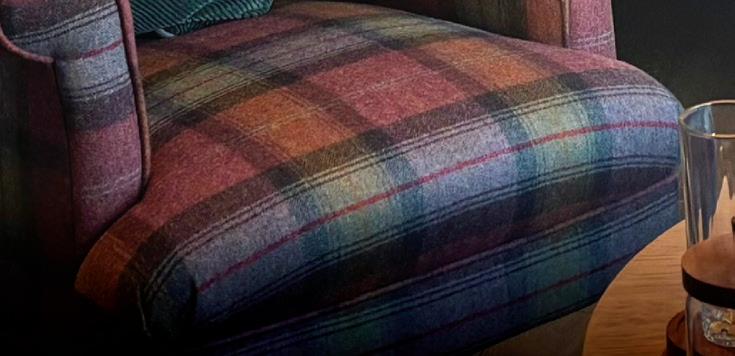

Twelve Nordic-style cabins have opened at Ballygarry Estate Hotel and Spa in




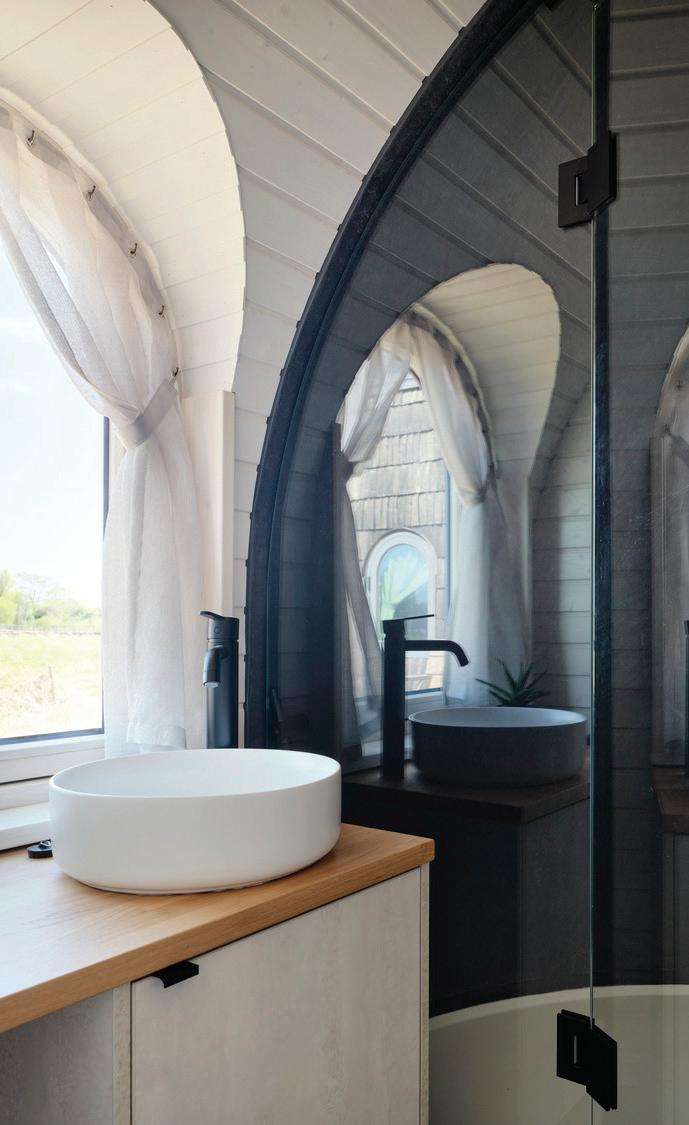


Ballygarry Estate Hotel and Spa has launched The Estate Cabins – an off-grid experience that combines ecotourism and luxury. The new venture consists of 12 adult-only cabins, each positioned for impressive views of the Slieve Mish Mountains and the surrounding estate. Four are open for bookings so far; the remaining eight will open later in the summer.
Hotels across mainland Europe are increasingly adding Nordic-style cabins to their offering, says hotel owner Padraig McGillicuddy. “Accommodation like this appeals to the younger generation. They don’t necessarily want to stay in the traditional concrete block of bedrooms, they want something more experiential, off-grid and sustainable. Over the past five years, we’ve worked hard on our sustainability programme to reach a carbon neutral status. This idea of investing in luxurious yet sustainable cabins was a natural progression.”
The ready-made cabins are plug-andplay, eliminating the need for hard to find tradespeople. “I stumbled across the company that provides them and straightaway, I knew they were what I was looking for. So far, the response has been phenomenal. I think 90% of the business will be domestic. The cabins will also appeal to the FIT market; there’s a real desire for an offering like this and there’s nothing like it on this scale in the South West of Ireland.”
Guests staying in one of the cabins will leave their car in the hotel carpark and be taken by electric golf buggy 500m to their accommodation. On the way, they’ll learn about Ballygarry’s sustainability initiatives which include the apiary, beehives, wildflower and bluebell meadows and integrated constructive wetlands. They'll also hear about the hotel's carbon neutral status on its scope 1 and 2 emissions (“we’re working on scope 3 at the moment”). Wastewater goes directly into the estate’s onsite integrated constructed wetlands, which uses a reed bed filtration system to treat the wastewater and in turn, offsets a massive amount of carbon.
Each igloo-shaped cabin, named after trees found throughout the estate, features only Irish-made furniture and furnishings.
“There are baskets weaved in Castle Gregory, pottery from Dingle and rugs made in West Kerry.” Each morning, guests will find freshly baked bread and scones at their door. “The kitchenettes have an espresso machine and guests can also snack on fruit compotes, granola or eggs from a local farm while they sit outside and watch nature go by. Then, they'll stroll up to the hotel for a

The idea
is that
more substantial breakfast. The idea is that you’re getting away from the traditional hotel concept of bed and breakfast and moving towards what Gen X and Y are after – a new off-grid idea of tourism that’s very different to what we would have known previously.”
Guests are getting the best of both worlds, says Padraig. “They’re getting that outdoors experience but they’re also going up to the hotel for meals and to use the facilities. That’s why we didn’t put cooking facilities into the cabins; people don’t stay in hotels to cook. They can either walk or cycle up to the hotel and if it’s raining, we’ll come and get you.”
you’re getting away from the
traditional
hotel concept of bed and breakfast and you’re moving towards what Gen X and Y are after
A series of initiatives over the past few years means Ballygarry is now a carbon neutral business. One of the first steps was a move to green energy. Coal in the hotel’s open fires was replaced by timber and gas condensing boilers replaced oil. “Even though it’s a fossil fuel, it’s offset by the 30,000 trees across the estate. The integrated wetland sequesters a large amount of tons against it too. The latest results show that we’re actually carbon negative now.” Padraig and the team are currently looking at scope 3 emissions. “We’re working on the emissions in our supply chain, which is a complex process. It’s so difficult for small suppliers to get on board with lowering their emissions. They just don’t have the time, so we’ve got to do it for them. Our Green team in the hotel are leading that project, led by our Hotel Manager TJ.”
Plans are in place to develop a solar farm to power the cabins. Family cabins are also on the agenda, says Padraig. “Next year, I’d like to extend the offering to include two-bedroom cabins with a loft conversion. Our sales staff have stayed in the cabins so they’re able to tell guests exactly what to expect. That experience of nature, of the birds chirping all morning and the spectacular views, there’s really nothing like it.”


The
The Kerry based, family-run O’Donoghue Ring Collection has proudly unveiled the first glimpse of the extensive redesign and renovation of the Killarney Plaza Hotel & Spa. This transformative project, which began in Spring 2024, marks the initial phase of a meticulously planned revamp, designed to honour the hotel’s classical aesthetic while seamlessly blending modern luxury with the natural beauty of Killarney National Park.
This phase of the reimagination showcases a complete transformation of the hotel’s suites, superior deluxe bedrooms, and guest foyers, alongside a stunning renewal of ‘Le Grand Pey’— the hotel’s dining room—and a refined upgrade to the hotel’s Health Club.
Speaking of the refurbishment, Managing Director, Gemma Ring commented: “We’re excited to unveil phase one of our refurbishment, a timeless renovation that honours our respect for tradition, quality, sustainability and exceptional guest experiences. We’ve remained open while working through this exciting new chapter and moving into phase two will see the continuation of all 198 guest rooms including our deluxe and classic room categories. We look forward to welcoming guests to this new chapter of Killarney Plaza Hotel & Spa”.


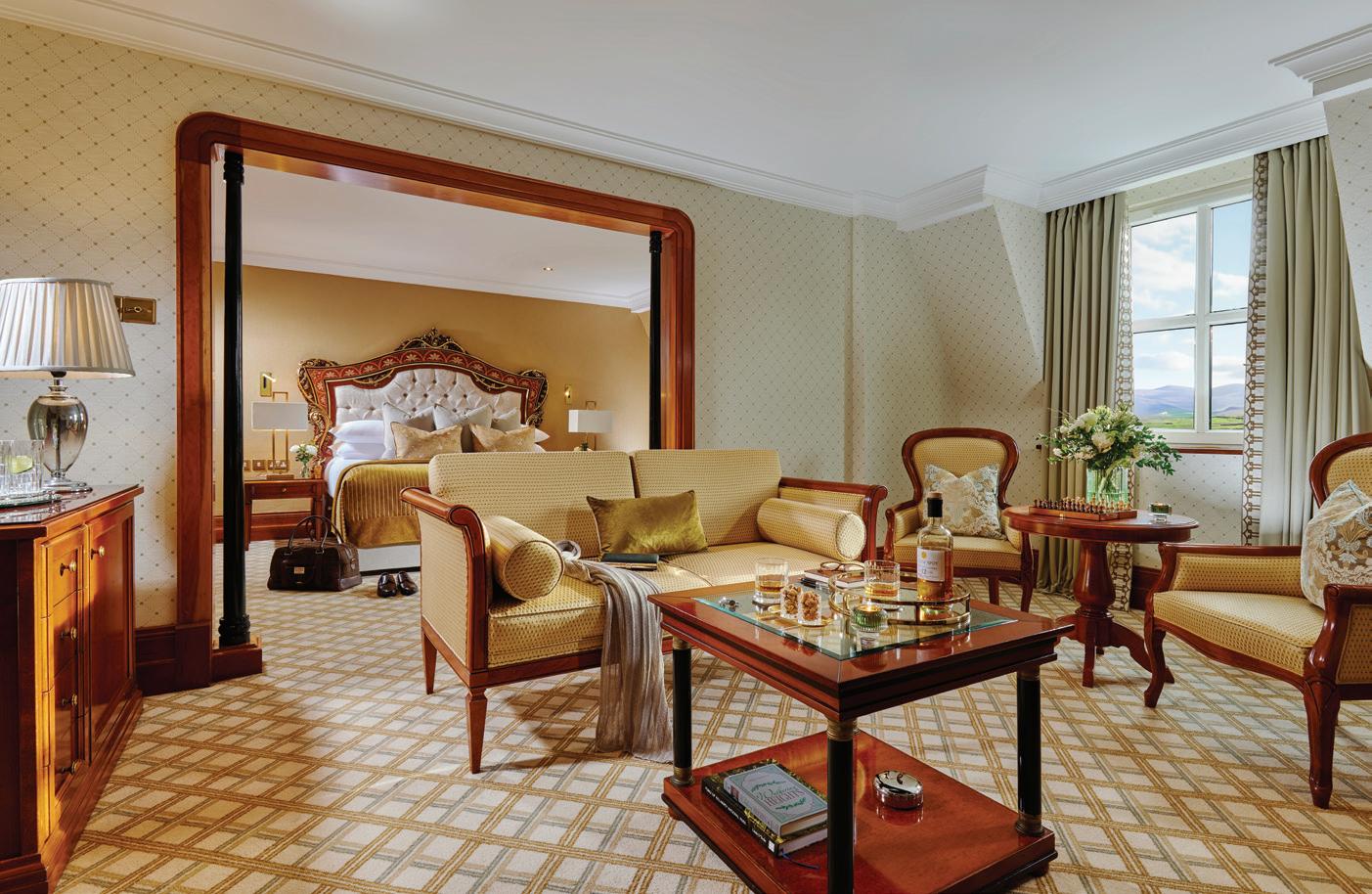
The newly redesigned suites offer an elevated sense of luxury, with sweeping views from the parklands to the rugged McGillycuddy Reeks. The walls are adorned with exclusive landscape photography by renowned Kerry artist Norman McCloskey.
The grand suites and superior deluxe bedrooms are designed in palettes of warm golds, deep ambers, soft greens,
and refined blues. Rich wood finishes, classical lighting and mirrored accents lend a quiet elegance, while handfinished Italian furnishings balance sophistication with comfort.
Every detail is designed with rest and relaxation in mind—from premium bedding to upgraded bathrooms featuring handcrafted marble tiles, walkin showers and luxury amenities by Irish skincare brand, The Handmade Soap Company.



We’re excited to unveil phase one of our refurbishment, a timeless renovation that honours our respect for tradition, quality, sustainability and exceptional guest experiences
In line with the O’Donoghue Ring Collection’s sustainability commitments and innovative ethos, the Killarney Plaza’s renovation integrates eco-conscious practices throughout. The project incorporates:
» Sustainable materials and energy-efficient lighting to reduce the hotel’s environmental footprint.
» Water-saving fixtures for a more responsible yet indulgent guest experience.
» Eco-friendly wooden key cards, alongside digital room access via a mobile app, enhancing convenience while minimising waste.
The commitment to sustainability extends beyond materials—local craftspeople have played a key role in the project, ensuring a thoughtful approach to design that aligns with the region.
The transformation of ‘Le Grand Pey’ preserves its timeless elegance. Guests will be welcomed into a sophisticated space, bathed in natural light, where expansive windows frame a special view of the neighbouring National Park and Killarney House and Gardens. A unique perspective from within the town.
Key design enhancements include:
» Champagne-toned drapery, textured wallpaper and custom panelling with premium-grade carpeting and finely crafted furniture.
» Preservation of the rooms classic marble details and original architectural features.
With its unique ambiance, ‘Le Grand Pey’ sits as a premier venue for sophisticated dining and exceptional events, complementing the hotel’s renowned culinary destinations, Café du Parc and The Tan Yard.
Wellness remains at the core of the Killarney Plaza experience. The extensive Health Club has also undergone an upgrade, with enhanced fitness amenities.
New features include:
» A redesigned fitness studio with the latest cardio and strength-training equipment.
» A new 90-degree sauna for deep detoxification with an upgraded steam room and revitalising rain shower.
» A cool-down zone with chilled towels and refreshments, elevating post-exercise recovery.
As part of the hotel’s ongoing evolution, the redesign of all remaining classic and deluxe bedrooms will continue into 2026.
With this ambitious transformation, Killarney Plaza Hotel & Spa continues to set new standards in luxury hospitality, seamlessly merging tradition with refined elegance, sustainability and world-class comfort.

At a time when we’re experiencing major costs around doing business, it’s essential to get the correct information

IHF President Michael Magner is calling for a framework that ensures the industry is fit for purpose

Back in April, the CSO released its statistics for inbound tourism which painted a contrasting picture to what’s actually happening on the ground. According to the Irish Hotels Federation, the figures were out of kilter with the latest industry data which showed that in March, hotels achieved average room occupancies on a par with the same month in 2024. Bookings for the first quarter were up 2% year on year – all positive signs that overall tourism activity is holding up in 2025.
So why are the CSO figures so misaligned with the reality of what’s happening in the industry? “It’s a question we would like answered too. Perhaps the data for 2024 has been overstated by some methodology error or otherwise. We at the IHF think the issue is with the 2024 data and that’s what needs to be investigated. Getting those figures right is so important; it helps our industry shape decisions around how businesses formulate their marketing plans, how they make decisions around investment and the business model that they operate within. At a time when we’re experiencing major costs around doing business, it’s essential to get the correct information,” says IHF President Michael Magner and owner of Vienna Woods Hotel.
The IHF’s data is correct, says Michael. “We’re confident of that for a few reasons. The IHF is the largest representative of the accommodation sector in Ireland, with a membership base that represents the majority of hotel guest rooms. We survey our members on a regular basis and in fact, we carried out a survey in anticipation of the CSO stats. We also look at other international benchmarking data sources along with access points to the country, primarily airlines and airports, which are confirming there isn’t any concern around occupancy or visitor numbers to the island.” With just shy of 1,000 members representing over 65,000 jobs, members aren’t voicing their concerns over decreasing numbers. “If there was a drop in international visitors for March and February, our members would be on the phone to us. That’s not happening.”
Visitor numbers may not be an issue for hoteliers, but rising costs are. The industry needs to operate in a robust business environment that’s fit for all, says Michael. “The hotel industry is made up of largescale hotels in urban locations, primarily driven by accommodation provision. Smaller hotels located outside urban areas are generally driven by food and beverage and yet, they’re all classified as hotels under current legislation. That business model
is challenging, particularly for hotels of an average size. The cost of purchasing food has spiralled to an unsustainable level and is creating serious difficulties for hotels and for smaller properties in particular.”
A sustainable framework to ensure the industry is fit for purpose is required. “It’s especially needed for those parts of the country where if you took the tourism and hospitality products out, there would be nothing else there to provide employment. We need to tackle the cost of doing business in Ireland, not just for our industry, but for every business. There is nothing that I could identify in my business that hasn’t experienced some degree of inflation over the last number of years and while inflation is to be expected, what we’ve seen are abnormal levels of inflation far above normal annual rates.”
The National Training Fund should be utilised to help address skills deficiencies within the industry. “If I were to hire an apprentice to work in my kitchen, I would have to pay them the national minimum wage, which the IHF believes is a great initiative. Once that student goes to college to learns their skills, I as the employer must pay the student out of my business. Those wages cannot come out of the National Training Fund, which is in sharp contrast to other industries. How is that fair?” Some businesses are unable to meet those costs.
Looking after our people is crucial. We need to attract people into what is an incredible, vibrant industry
“So what you have are hotels that can’t afford to employ apprentice students because they simply can’t carry that cost. There’s a major imbalance there that needs to be tackled. As an industry, we need to work in partnership with our educators in third-level institutions and indeed the Department of Higher Education to identify the opportunities available in the hospitality sector.”
At Vienna Woods guests receive one room key, to be used to access the room and to power it. When you head down for dinner or go out for a stroll, you take the key with you. “You’re far less likely to waste energy because you’ve only got one key. When guests inevitably ask for a second key, of course we give it but we also use it as an opportunity to explain why we only give one key in the first place. We say it’s part of our sustainability policy and once we do that, 90% of our guests decide not to take the second key.” Small changes can make an incredible difference in helping a hotel meet its sustainability objectives. The hospitality industry is, says Michael, best placed to be leaders in this space. “If the various tourism agencies, the hospitality industry, the IHF and government came together to set a goal to make Ireland the greenest country in the world… there’s so much we could achieve. Costa Rica has claimed the title of world’s most sustainable island, so it’s certainly achievable and would be a major driver of sustainable tourism.”
As IHF President, equipping hotels with the knowledge they need to place their business on a more sustainable footing is something Michael is passionate about. “It’s as important as the cost of doing business. Looking after our people is also crucial. We need to attract people into what is an incredible, vibrant industry.”
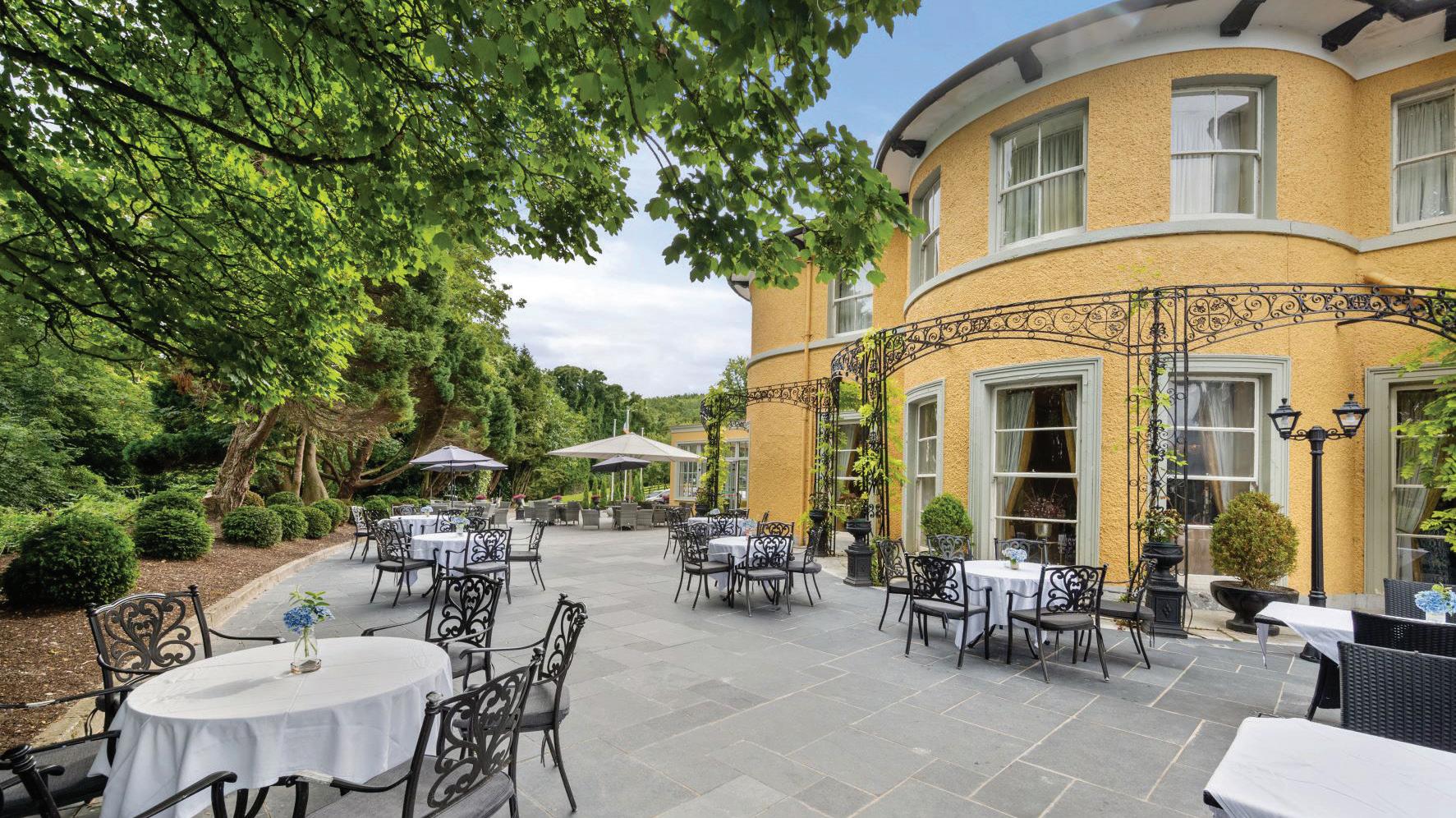



Radisson Blu Hotel Dublin Airport is celebrating a double win for exceptional team culture
Radisson Blu Hotel, Dublin Airport has announced two significant accolades that celebrate the heart of its success – its people. For the second consecutive year, the hotel has been named a Great Place to Work and has also received the Fáilte Ireland Employer Excellence Award for Best Large Employer.




These achievements reflect the strength of a workplace culture that’s inclusive, diverse, hardworking – and above all – team-driven. At the core of this culture is Elaine Carolan, General Manager for the past eight years and winner of the IHI General Manager of the Year in 2022. Her steady, people-focused leadership has shaped a team environment where respect, opportunity and celebration are part of everyday life.
The Fáilte Ireland Employer Excellence Awards honour tourism businesses leading the way in employee engagement and workplace culture. What makes this recognition truly special is that it is based entirely on employee feedback. Radisson Blu Hotel Dublin Airport is proud that its people feel seen, heard and appreciated –

The hotel is proud to be a workplace where over 20 nationalities come together, bringing unique perspectives, talents and stories to the table
and that their voices helped the hotel earn this prestigious national honour.
Radisson Blu Hotel, Dublin Airport’s culture is defined by genuine warmth, teamwork and a shared commitment to excellence. The hotel is proud to be a workplace where over 20 nationalities come together, bringing unique perspectives, talents and stories to the table. From daily operations to staff events and community outreach, there is a strong sense of fun, unity and belonging that fuels everything it does.
The second Great Place to Work certification reaffirms this commitment. It’s more than a title – it’s a reflection of a team that shows up every day with passion, pride and professionalism. Whether it’s supporting one another through challenges, celebrating achievements or delivering unforgettable guest experiences, the Radisson Blu Dublin Airport team truly exemplifies what a great workplace should be. “These awards are a tribute to every team member who makes this hotel such a special place to work. It’s their energy, their ideas, and their commitment that make the difference and I couldn’t be prouder,” says Elaine Carolan.
PATRICIA
on Limerick’s thriving tourism market and delivering on the customer experience
“It’s about


Limerick is developing a reputation as a sustainability hotspot amongst tourists on the hunt for a greener break. Earlier this year, a Forbes article described the “quiet sustainability revolution” that’s happening across the city, “from its castles to its new bike paths, it’s a city that’s leaning into the green.” As well as international guests, domestic business is also strong; figures from the CSO showed that the Southern region, which includes Limerick, Kerry, Cork and Clare, accounted for almost 45% of all domestic trips in Ireland in Q4 last year
That repositioning of Limerick as a sustainable tourism destination, along with the CSO data, is very much reflective of what’s happening in the city says Patricia Stewart, owner of No 1 Pery Square. “I think traditionally, Limerick was seen as a gateway city to the Wild Atlantic Way or an urban stop
That repositioning of Limerick as a sustainable tourism destination, along with the CSO data, is very much reflective of what’s happening in the city
on route to Kerry from Galway. Now, people are coming to the city for a longer stay and they’ve got a specific activity in mind, whether that’s a walking tour, exploring places like Ballyhoura, kayaking or horse-riding. It’s not just about going to The Burren anymore.”
During Covid, tourism and travel groups such as Limerick.ie saw an opportunity to drive Limerick city and county as an activities-based destination. “Since the pandemic, outdoor activities are top of the wish-list for guests. US visitors have traditionally made up the majority of our business but this year, we’re seeing a lot of bookings from German and UK guests who are coming to Limerick for activity breaks. Before Covid, that wasn’t happening and Limerick wouldn’t have been viewed as that kind of tourism destination.”
Bookings are also looking strong for the rest of the summer at the 21-bedroom townhouse, located in the city’s Georgian quarter right across from the People’s Park.

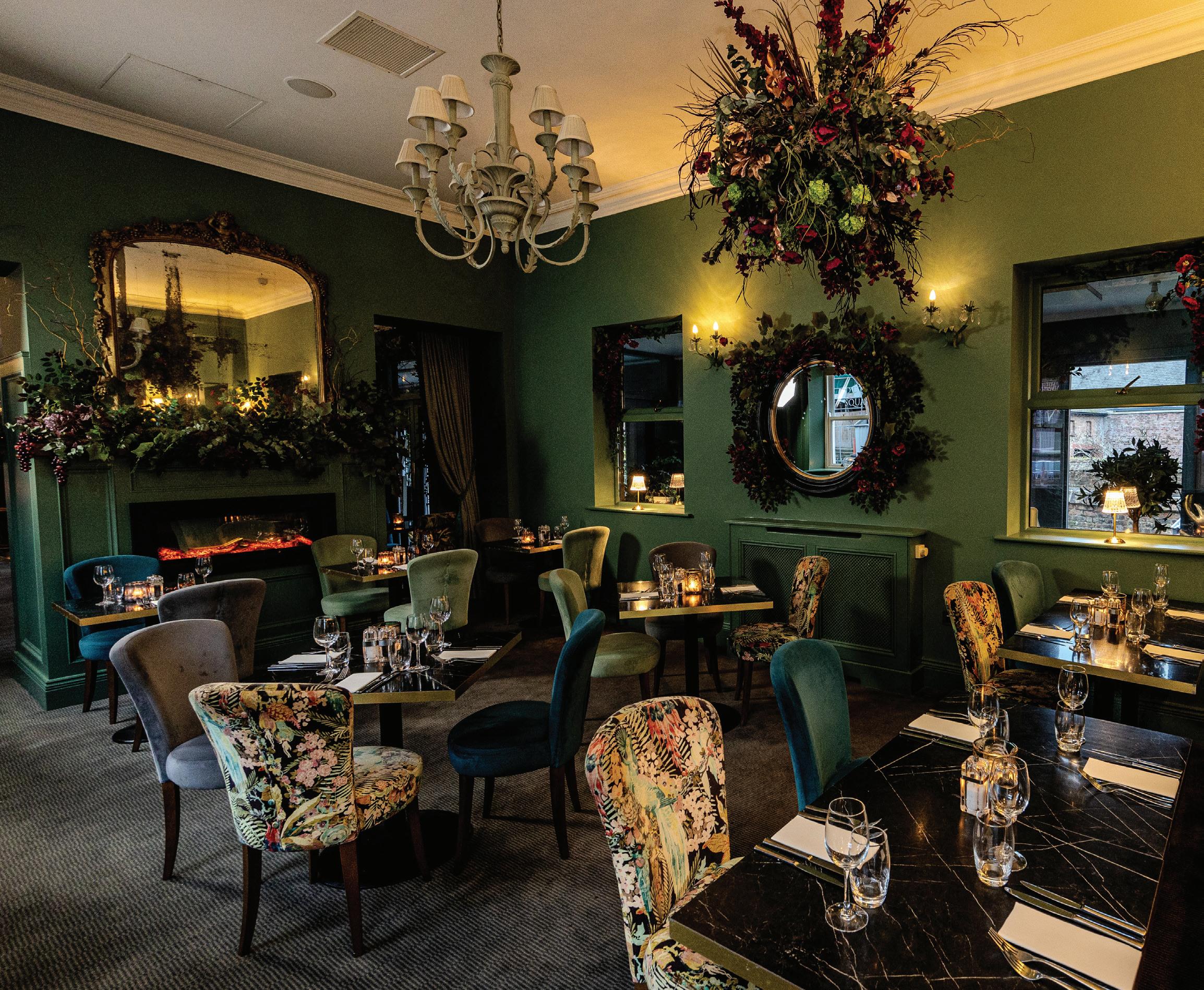
Patricia purchased the property 15 years ago. Previously, she ran a marketing service for independent hotels and went on to create the Select Hotels of Ireland brand for independent Irish hotels, selling the business on in 2010. “I studied hotel management in Cathal Brugha Street and followed up with a Master’s in the importance of Georgian architecture to the tourism industry. I’ve always had an interest in both tourism and property, particularly buildings with history and heritage. My aim was to combine the two.”
The idea was to create a hotel rooted in Irish heritage, that served proper Irish food and provided authentic Irish experiences. Originally from Limerick, Patricia returned to the city and the search began. When it came up for sale, No 1 Pery Square immediately sparked her interest. It’s one of a terrace of six Georgian houses built around 1830 by the Pery Square Tontine Company. It was once owned by Lord Barrington, an Anglo-Irish merchant and benefactor. Today, one of the rooms at No 1 Pery Square is named after him. A refurbishment programme followed the purchase, giving each room its own identity – every room has a different look. “We attract a lot of guests that have an interest in Georgian architecture or who





are after an authentic Irish food experience. We’re definitely not like other chain hotels.”
Delivering on the customer experience and creating magic moments for guests is a big thing for me. It’s about taking care of people
In 2024, No 1 Pery Square was awarded a Michelin Key. This is, said the Michelin Guide, a hotel that “gets the aesthetic just right, from the ornate marble hearth to the gilt-framed mirrors.” After 15 years, the Michelin nod was an acknowledgement that she was doing something right, says Patricia. “It was validation and I think the fact that it was a Michelin Key reinforced it further. Getting the Key means you’re recognised for the complete guest experience, from check-in to overnight stay to breakfast, everything.” The hotel has also won the Great Place to Work award for three years running. With 40 staff members, some of them long-standing, Patricia has no issues around staff recruitment or retention. “I know how lucky we are in that respect. For the last 10 years or so, we’ve mostly had the same staff. We kept them all on through Covid and while that was a big investment, it was very worthwhile.”
There are other challenges though, with the cost of doing business front and centre. “Hospitality and in particular, the restaurant sector, has been totally squeezed. I think the Irish government has been exceptionally unfair and ignorant in their dealings with restaurants. We need the small, independent restaurants in every provincial town in Ireland, but they’re being forced out of the market. There’s been no proper support for them and that concerns me greatly for the future of Irish tourism.” Bringing the VAT rate down needs to happen now as opposed to down the line. “We’re losing businesses in this industry every day. Sometimes, you have to make a change and make it fast. If we as hoteliers sat on our hands and waited to make decisions, we wouldn’t be in business.”
To break even, No 1 Pery Square must be 90% full continuously. “A few years ago, that figure would have been at about 60%. We’re a small business so we’re constantly fighting to stay operational, while at the same time providing a very

high level of care to our customers. A certain cost comes with providing that level of care.”
No 1 Pery Square is in a good place, but there’s no room for complacency in the hotel sector. “This week might be great, but I still need to worry about next week. Despite the uncertainty, it’s such a rewarding industry. Delivering on the customer experience and creating magic moments for guests is a big thing for me. It’s about taking care of people.”

The Culinary Director at Fitzpatrick Castle Hotel on why he loves the “organised chaos” of the industry
HOW’S BUSINESS AT FITZPATRICK CASTLE HOTEL?
It’s good. Room occupancy is healthy and although tourist numbers may be slightly down, we’re optimistic for the summer. We recently launched our summer pizza menu on the terrace, our guests really enjoy that. We’re constantly trying to maximise revenues and identify areas where we can improve.
HOW LONG HAVE YOU WORKED AT THE HOTEL?
I joined the team in June 2024. Before that I was with The MHL Hotel Collection for about eight years. I started off at The Trinity City Hotel before taking a role as Cluster Executive Chef in 2018. A role as Executive Head Chef at The Westin (now College Green Hotel) followed before I moved to Fitzpatrick’s. Working in a 5 star hotel like The Westin was an amazing experience, although I think customer expectations between 4 and 5 star hotels have shortened.
WHAT DO YOU LIKE ABOUT FITZPATRICK’S?
There’s a lot of freedom around menu choice. I have a great relationship with management and they’ve given us carte blanche to produce menus that are new, innovative and fresh. I think a lot of the time, chefs fail to remember who they’re cooking for. You have to know your audience and you have to create menus that they will appreciate.

HOW DID YOU GET INTO THE INDUSTRY?
It’s in the family to a degree. My uncle was a chef in The Montrose and my grandfather was a chef in The Shelbourne. I had no inclination to become a chef but when I finished my Leaving Cert, I decided I’d take a part-time job as a commis chef for the summer in Bewley’s on Grafton Street. Here we are, 46 years later, still working for the summer I suppose! It’s a tough industry, but it can be so rewarding as well.
IN THOSE YOUNGER YEARS WAS THERE A LIGHTBULB MOMENT WHEN YOU REALISED, I’M ACTUALLY GOOD AT THIS?
There was but it took me a few years to realise it. When I worked my way up to senior chef de partie level I remember thinking, I can do better than this. So I left and took over a restaurant. For six weeks, I made a hames of it and knew I wasn’t ready for a step like that. So I went back with my tail between my legs and started learning again. I ended up in Bijou in Rathgar for three years and that’s where I honed my skills. I had a great team around me that pushed me to learn every day. From there, I went for a sous chef role at FXB’s on Parkgate Street. After a week, I was offered the head chef’s role which I was totally unprepared for but I took it on and stayed for a few years. That was also a great learning experience and allowed me to step into a group role.

I think a lot of the time, chefs fail to remember who they’re cooking for. You have to know your audience and you have to create menus that they will appreciate
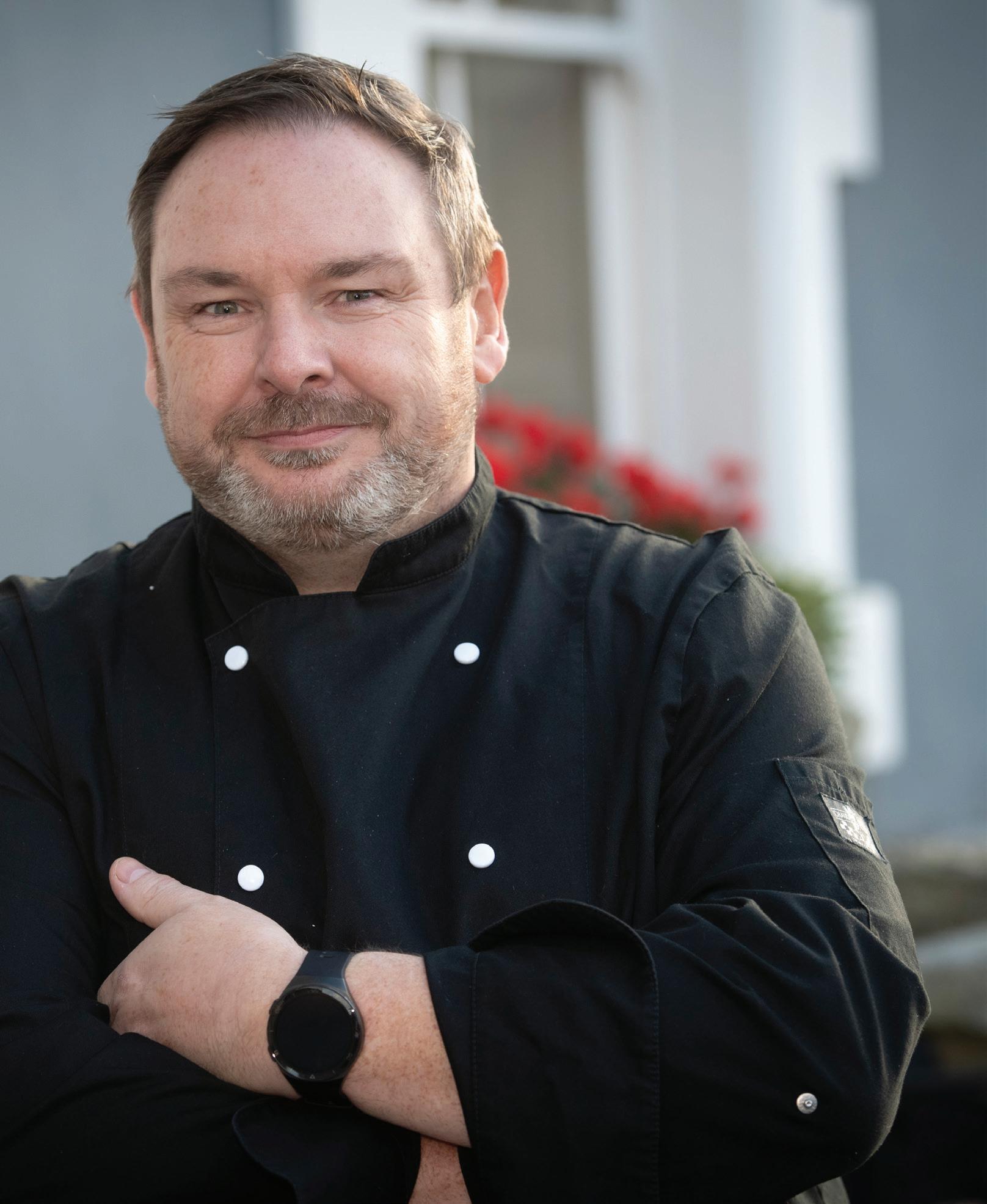
IS THERE A PARTICULAR PERSON THAT PUSHED YOU TO SUCCEED IN YOUR CAREER?
In the industry, Des Buckley gave me great insight and advice around my career. I learned a lot from him. Outside the industry, my wife has been my biggest cheerleader. It takes a lot of patience and perseverance to be a chef’s wife.
IS IT HARD TO GET STAFF?
I’m lucky in that at the moment, I’m not recruiting for any positions in the hotel. We have a team of 20 across four kitchens, two of which operate seven days a week. The team is pretty much settled and most of them have been there for the past couple of years.
There are so many opportunities for continued learning and training for both myself and the team, whether that’s around menu development, procedures or staffing. It’s a great industry to be in
I have a very strong number two – Alex –who came on board about a month after me.
I think the hardest job to fill is the kitchen porter. When new chefs come on board I always explain to them, we can’t do our jobs without these guys so they must be treated with respect and make sure they’re looked after, like anyone in the kitchen.
WHAT ARE THE BIGGEST CHALLENGES YOU FACE AS A CHEF?
Rising prices are difficult to deal with. Fillets are something I haven’t put on the menu since I took on the role. If there’s a function on and someone wants to pay a premium that’s no problem, but otherwise we don’t serve them. We’ve moved towards
cheaper cuts but they’re also becoming more expensive. Jacob’s Ladder has increased in price and so has pork belly. Over the past couple of months, beef and chicken have shot up in price and it’s extremely worrying. I don’t think those prices are going to go back to where they were.
HOW DO YOU DEAL WITH THAT?
We have to go back to the drawing board and become more creative. I think it’s making chefs be a bit more attentive with lesser cuts and really dig deep when it comes to how we can offer our customers flavour along with value for money.
HAVE YOU INTRODUCED ANY INITIATIVES AROUND FOOD WASTE?
We have. We’ve found that most of our wastage is on buffets so we’re now providing smaller plates so guests are less inclined to overfill them. We do a lot of sous vide cooking and reheating of portions of food, so we’re not overusing. We’re very much controlling the food that’s going into our banquets and gauging the room before we send it out. Also, I’ve been in this industry now for so long that you know what guests want on a menu. If you have beef and salmon for argument’s sake, you know that it will be two to one beef. If we’re using chicken for a function, the same chicken will be used for a salad later that day
WHAT’S YOUR FAVOURITE THING ABOUT THE INDUSTRY?
I suppose I enjoy the organised chaos. No two days are the same. There are so many opportunities for continued learning and training for both myself and the team, whether that’s around menu development, procedures or staffing. It’s a great industry to be in.

























With a healthy intake of US guests, it's looking like a busy few months for Cahernane House General Manager EMER CORRIDAN

Askany GM to describe Ireland’s hotel sector and the word ‘uncertainty’ will almost always come up. Traditionally it’s an ever-evolving industry, but geopolitical conflicts are taking that level of uncertainty to a whole new level. It’s a different environment to what it was in 2016 when Emer Corridan took up the GM role at Cahernane House in Killarney. “Back then, you pretty much knew your market. We would have had a nice mix of Irish and European guests, which included a lot of German, Dutch and French. We haven’t really seen that market at all this year, but we're seeing strong numbers from the US; American guests are still happy to pay the rate we need to make the business viable. We’re not sure why there's been such a drop in European guests. Our travel agents are saying that cost may be part of the reason, or perhaps they're foregoing Ireland for other countries. They’re certainly not in Kerry.”

The CSO-cited drop off in US visitors to Ireland isn’t something Emer is seeing at Cahernane House. “We’re having a strong year, which is mainly due to the American market. I’ve heard mixed reports from some of the other hotels in PREM Group, particularly in Dublin. We’re lucky – we’re up on 2024 and on what we had forecast for this year. US tourists with bookings for 2025 will go ahead with their plans; I’d be more concerned about 2026. With everything that’s happening globally, it may present more of a challenge. The industry is so hard to predict compared to when I took up the GM role here.”
Emer joined Cahernane House in 2016, the same year it was purchased by PREM Group for €3 million. Serious investment was required; the house was in a state of disrepair and needed both modernisation and refurbishment.
“In my first month, a ceiling came down in one of the bedrooms.
Plumbing and electrics were also in poor condition. Between 2016 and 2020, PREM invested almost €10 million into the property to restore it to its former glory.” In that first year, the 12 rooms in the original Manor House were refurbished and individually decorated. From 2017 to 2018, the remaining 28 bedrooms, known as the Garden Wing, were refurbished. “€10 million is a huge investment to put into 40 bedrooms. Every single element was carefully considered; each room has antique furniture that was sourced specifically for that room.” In 2019, the old 8-bedroom carriage house outside the hotel was refurbished. “Again, they all have their own individual styles and each room is named after the local flora and fauna found in Killarney National Park.”
STAFFING & ACCOMMODATION

Every single element was carefully considered; each room has antique furniture that was sourced specifically for that room

Cahernane House closes every January and February. “Closing for those few weeks gives us a chance to carry out any work that’s needed. It also makes financial sense. With almost 40 hotels in Killarney, there isn’t enough business to sustain the hotel all year round.” Longstanding members of staff are also happy with the break. “Like any hotel, we always lose some seasonal staff so we try and recruit in January and February. Staffing is a challenge. At the moment, I need a new chef and it’s proving very difficult to find one. I’m lucky that I have a core team of five chefs in the kitchen, but finding additional qualified people is so hard.” Recruiting staff is one issue,
but finding them somewhere to live in Killarney is another. In 2018, Emer advised the owners that buying a property for staff to live in would be a good idea. “We have a four bedroom house close to the hotel for staff. Finding rooms to rent in Killarney is almost impossible. Just last week, I did a search online to see what’s available in the town centre and just two rooms for rent came up. A lot of property that comes up for sale in the town is being bought by hotels to house staff. Even if a really good CV lands on my desk, chances are I can’t take them on because our house is full and they won’t be able to find a place to live. It’s becoming a huge challenge.”

Up until recently Herbert’s Brasserie, headed up by Head Chef Cormac Vesey, offered guests a fine dining menu. This year, guests will enjoy a more casual dining experience. “Fine dining just wasn’t working for us. We weren’t making money in our food and beverage departments. I think our guests, particularly our US visitors, are after a more relaxed dining experience. They also want to see that we’re using local produce, that we’re using grass-fed Irish beef and that everything is Irish and seasonal. Thankfully, the new menus are going down very well.”
Additional bedrooms – “we could do with
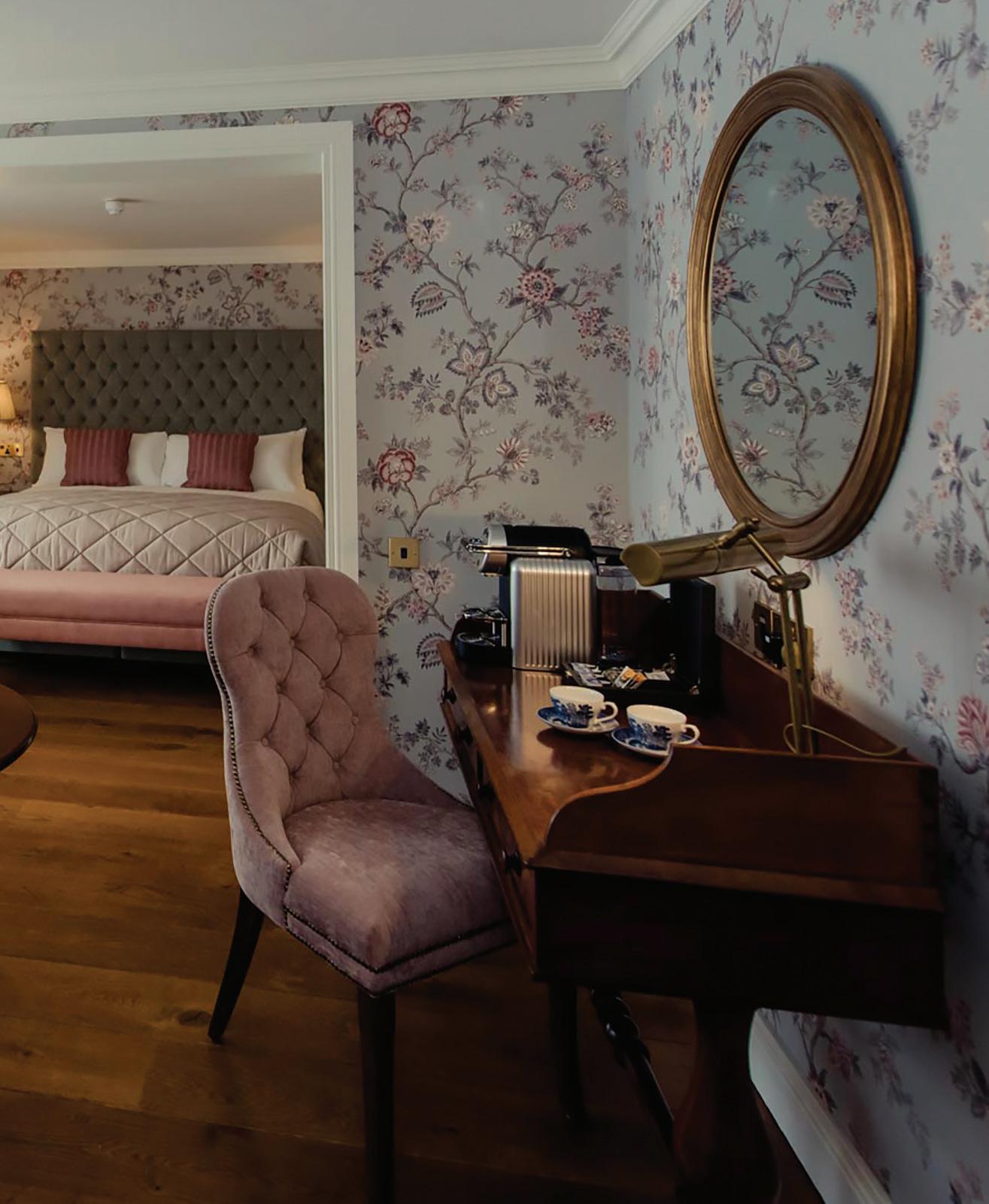
Traditionally, it was seen as a job with long unsociable hours but for many roles in the industry, that’s not the case anymore. The possibilities are endless


another 10 or so” – are in the mix in the next year or two, along with a kitchen extension. “The kitchen is quite old and although we have new equipment, it needs to be modernised to create more space. Extra rooms are also needed. We don’t want to lose that lovely, intimate feeling that the hotel is known for but the demand is there.”
It’s that intimate, old-world feel that first attracted Emer to the hotel and before that, to the Great Southern in Killarney. Work experience at the Beechmount Hotel in Navan first sparked an interest in hospitality, followed by roles in hotels in the Isle of Man, France, Wales and the US. “At the Great Southern my GM was Conor Hennigan, a well-known figure in the industry and a great manager to work with. I saw a huge number of changes in my time there, which coincided with the recession. It was a great experience and a great grounding for my role at Cahernane House.”
It may be an “uncertain” industry, but hospitality offers school leavers a host of opportunities. “Young people don’t realise the variety of roles that are available to them with a degree in hotel management. I also don’t think career guidance teachers are encouraging hospitality as a career. Traditionally, it was seen as a job with long unsociable hours but for many roles, that’s not the case anymore. The possibilities are endless.”

If they’re to attract the GEN Z GENERATION , hoteliers must recognise their traits and needs
Generation Z (also known as iGen or post-millennials) are the generation born between 1997 and 2012. As members of this generational cohort enter hotels as both customers and employees, it is important to recognise their traits and needs. This is a generation that grew up with technology as an integral part of their lives, never far from a smartphone or tablet, and they were taught to be more socially conscious than previous generations.
For Gen Z customers, in an era where personalisation and customisation are valued in service experiences, recognition of this is important in the hotel environment. Remember, this is the generation that has their own avatar on social media platforms. Their digital exposure has led to them expecting everything they want immediately. They are seeking personalised travel experiences, probably inspired by posts on social media platforms such as Instagram.
Guest loyalty programmes in hotels can offer them special rates and amenities, while influencer collaborations promote the hotel product online. Their desire for greater environmental awareness allows hoteliers to offer eco-conscious experiences in their properties while electric vehicle charging stations and locally sourced menu offerings, with food products on offer from a close local radius to the hotel, all help with this endeavour. These ethical and sustainability efforts by hotels should be highlighted in the hotel’s marketing. Authenticity is also crucial for this generation, hence the rise in popularity of platforms such as Airbnb and unique local city guided tours.
Gen Z is believed to account for over 30% of the global workforce in 2025 and hotel employers need to adapt to their values, preferences and expectations. If you are employing Gen Z cohort members in a hotel, one of their main focuses is flexibility. Remote and hybrid working opportunities have become the norm for them and they will embrace a workplace culture which promotes diversity, inclusion and belonging in a supportive environment. They seek out opportunities for personal development and growth, along with clear pathways within the workplace to pursue their advancement. They appreciate when hard work pays off and they can see the tangible results of this through promotion or increased pay and benefits. They value trust and seek both honesty and transparency in their dealings with employers, as they


This is a generation that grew up with technology as an integral part of their lives, never far from a smartphone or tablet, and they were taught to be more socially conscious than previous generations














value fair treatment. One of their prime goals in their life is the achievement of work-life balance and they seek out employers who embrace this concept. The integration of technology into the workplace is key for this generation and they welcome digital apps for tasks such as employee scheduling. Gen Z employees embrace all technology options that make their work-life smoother and create a more enjoyable work environment and they are drawn towards employers that use technological innovation to communicate easily with their team members. As with Gen Z customers, sustainability and the environment are important to Gen Z employees. They’re attracted to employers who show strong credentials in these areas.




























It is crucial to both understand and adapt to the needs of Gen Z customers who seek out increased engagement and more memorable experiences if you’re to attract and retain them in an increasingly competitive hotel market. In terms of Gen Z employees, key considerations in their attraction and retention include work-life balance, flexibility, digitalisation, trust, diversity and the creation of a positive workplace environment. They value the hospitality sector for its potential for fast career advancement, for its efforts in the area of sustainability and its initiatives in areas such as diversity, inclusion, belonging and the creation of a supportive work environment for all employees.


Sustainability and the environment are important to Gen Z employees. They’re attracted to employers who show strong credentials in these areas










So, what comes after Generation Z?












Next comes the Alpha Generation, those born after Generation Z and although they will not really figure as adult customers or employees for the next 10 years, we can already make some predictions about them. Technology, again, will be a large part of their lives as they are true digital natives and employers need to promote themselves on social media platforms such as Instagram and TikTok, portraying a positive and supportive work environment which supports professional development and demonstrates this through employee testimonials. Also, their mental health matters to them, therefore Alphas will require more support in this area from employers. From a future customer point of view, hotels should be prepared to offer digitally aided experiences encompassing visual learning and entertainment. Their environmental consciousness means that hotels must continue their sustainability initiatives and develop true green credentials. For this generation, all marketing claims will need to be evidence based.








And remember, the Alpha Generation’s traits are currently influencing their Millennial and Gen Z parents’ travel choices.















As a 2025 Hilton Hotels Trends Report found, 70% of survey respondents who travel with children choose their destination based on their children’s needs and interests. Hoteliers need to be cognisant of Generation Alpha’s traits and desires now if they are to attract this market today.



Dr Donagh Davern is a Lecturer at Munster Technological University and a former Hotel General Manager


There are meals that stay with you and then there are meals that genuinely change the way you think about food. For me, that happened at noma in Copenhagen, widely regarded as one of the best restaurants in the world. After my visit, I can say it earns that reputation in every sense.
At the time, I was working with a brilliant team and I travelled there with my head chef and sous chef. It was one of those rare trips where we were all equally excited, not just as professionals, but as people who love food. We sat down to 20 courses, each paired with wines that took everything to another level. It was three hours of complete immersion.
The setting was unforgettable. noma is surrounded by gardens and greenhouses and feels more like a food studio than a traditional restaurant. Even walking in, you sense that you’re stepping into something very different. The meal started with a potted plant, which actually held a hidden straw. Inside was a warm, silky potato soup, packed with flavour and completely unexpected. From that moment on, the surprises kept coming.
There were dishes made with foraged seaweed that captured the flavour of the coastline. A vegetarian shawarma made from celeriac and truffle that somehow had the richness of slow-cooked meat. A pancake made with mold, wrapped around plum seed ice cream, that challenged every idea I had about dessert. Each plate was carefully considered, beautifully executed and completely original.
What made the biggest impression on me though was what we saw behind the scenes. The kitchen was calm, focused and built on real respect for ingredients. Every element had a purpose. They used the whole fish, every trim of every vegetable, and transformed them into something valuable. It wasn’t just about sustainability, it was about seeing potential in everything you work
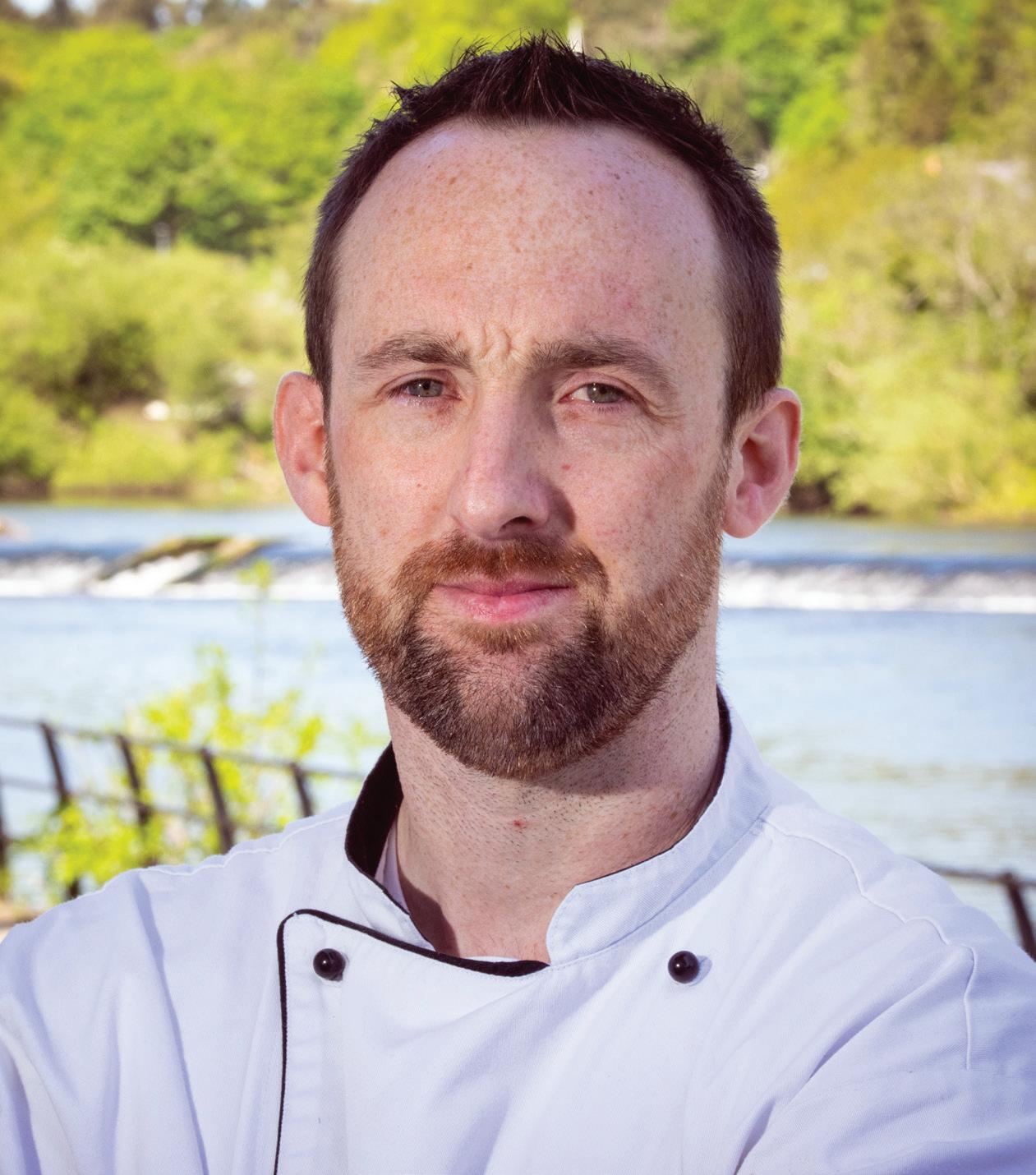
What made the biggest impression on me though was what we saw behind the scenes. The kitchen was calm, focused and built on real respect for ingredients
with. That approach stayed with me. It still influences how I run my kitchen here at The Kingsley.
That meal at noma wasn’t just a dining experience. It was a lesson in creativity, discipline and purpose. I came away inspired and reminded of what’s possible when food is treated with real care. It’s not the kind of experience you have often, but it’s one I’ll always remember. Without question, my most memorable meal.
Tim Daly is Executive Head Chef at The Kingsley, Co Cork




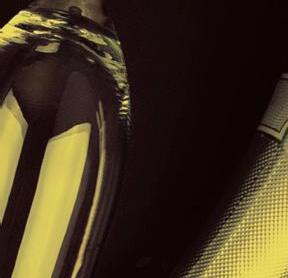






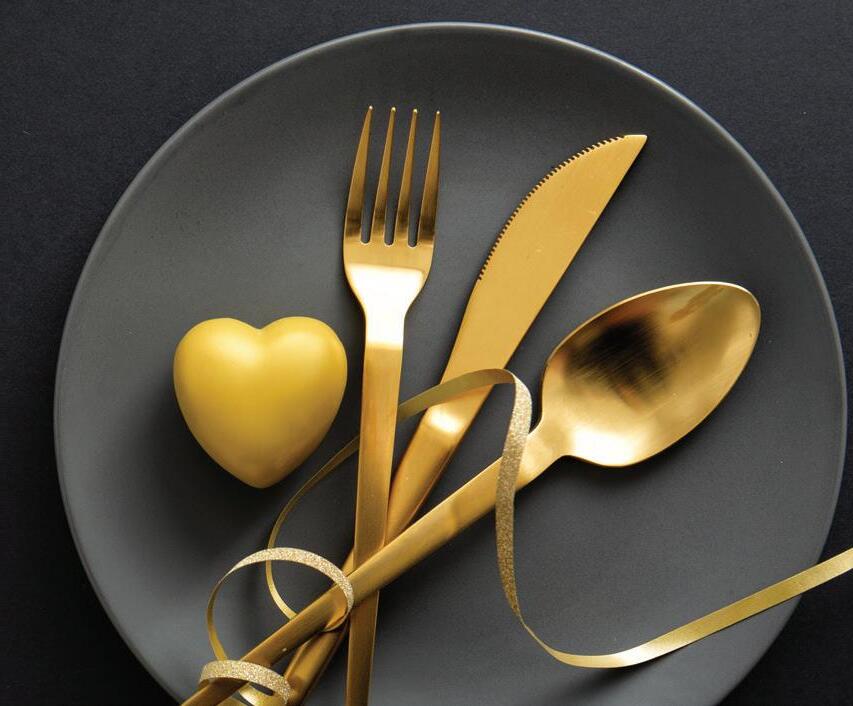


learniFI is Fáilte Ireland’s learning platform, offering over 250 courses and online content to upskill your teams and boost your tourism business. Designed by industry experts, there’s a wealth of knowledge just waiting to be discovered. Sign up today at failteireland.ie/learnifi
